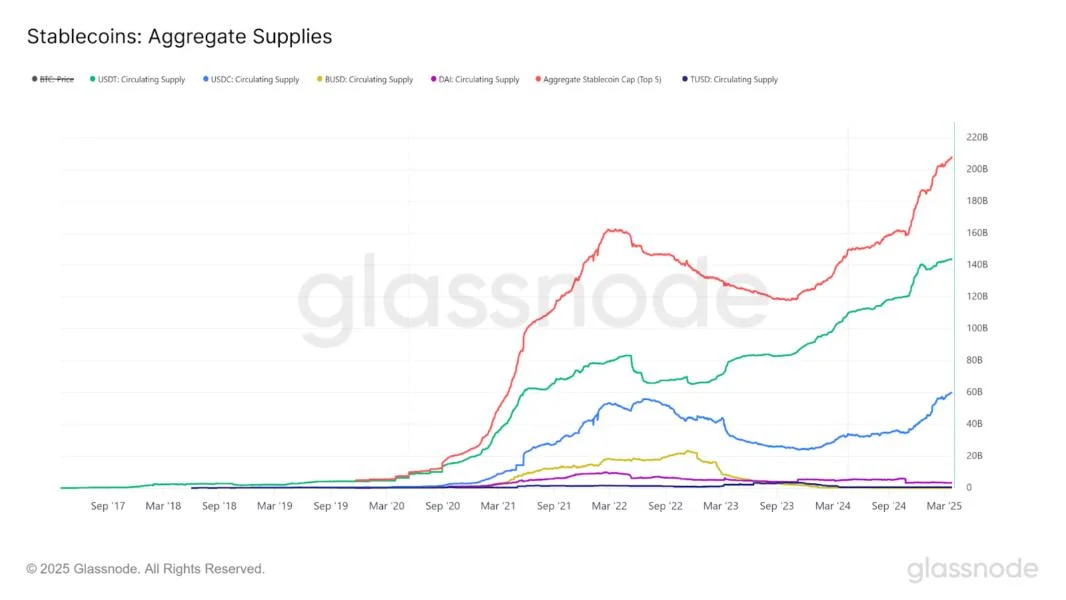Here’s what happened in crypto today

Today in crypto, CoinFund managing partner David Pakman said a $1 trillion stablecoin supply combined with yield-bearing crypto exchange-traded funds (ETFs) may provide the next crypto market catalyst for 2025, Elon Musk sold social media platform X to his AI startup, and two US federal agencies eased restrictions on companies engaging in crypto-related activities, including derivatives.$1 trillion stablecoin supply could drive next crypto rally — CoinFund’s PakmanThe global stablecoin supply could surge to $1 trillion by the end of 2025, potentially becoming a key catalyst for broader cryptocurrency market growth, according to David Pakman, managing partner at crypto-native investment firm CoinFund.“We’re in a stablecoin adoption upswell that’s likely to increase dramatically this year,” Pakman said during Cointelegraph’s Chainreaction live show on X on March 27. “We could go from $225 billion stablecoins to $1 trillion just this calendar year.”He noted that such growth, while modest compared to global financial markets, would represent a “meaningfully significant” shift for blockchain-based finance.Pakman also suggested that the rise in capital flowing onchain, combined with growing interest in exchange-traded funds (ETFs), could further support decentralized finance (DeFi) activity:“If we have a moment this year where ETFs are permitted to provide staking rewards or yield to holders, that unlocks really meaningful uplift in DeFi activity, broadly defined.”The aggregate stablecoin supply stood at an all-time high of above $208 billion across the five largest stablecoins on March 28, according to Glassnode data.“This is the major catalyst that’s been missing for over a decade: a major movement of people’s wealth onchain that brings everyone else on,” added Pakman.The growing stablecoin supply recently surpassed $219 billion and continues to rise, suggesting that the market is “likely still mid-cycle” as opposed to the top of the bull run, according to IntoTheBlock analysts.Elon Musk’s sale of X to xAI just made fraud lawsuit “a lot spicer”Billionaire investor Elon Musk has sold his social media platform X to his AI startup xAI, sparking controversy as it coincides with a US judge rejecting his bid to dismiss a lawsuit tied to the social media platform.The transfer of ownership of X to xAI on March 28 means that the class-action lawsuit against Musk — accusing him of defrauding former Twitter shareholders by delaying the disclosure of his initial investment in the social media platform — has become “a whole lot spicer,” Cinneamhain Ventures partner Adam Cochran said in a March 28 X post.On the same day that Musk said “xAI has acquired X in an all-stock transaction,” a US judge reportedly rejected Musk’s attempt to dismiss the lawsuit. Cochran said it has “opened up his AI entity to exposure here too, and it’s a much bigger pie.”Musk said the deal values xAI at $80 billion and X at $33 billion, factoring in $12 billion in debt from the $45 billion valuation. He originally bought X, formerly Twitter, for around $44 billion in April 2022.US regulators FDIC and CFTC ease crypto restrictions for banks, derivativesThe Federal Deposit Insurance Corporation (FDIC) said in a March 28 letter that institutions under its oversight, including banks, can now engage in crypto-related activities without prior approval. The announcement comes as the Commodity Futures Trading Commission (CFTC) announced that digital asset derivatives wouldn’t be treated differently than any other derivatives.The FDIC letter rescinds a previous instruction under former US President Joe Biden’s administration that required institutions to notify the agency before engaging in crypto-related activities. According to the FDIC’s definition:”Crypto-related activities include, but are not limited to, acting as crypto-asset custodians; maintaining stablecoin reserves; issuing crypto and other digital assets; acting as market makers or exchange or redemption agents; participating in blockchain- and distributed ledger-based settlement or payment systems, including performing node functions; as well as related activities such as finder activities and lending.”FDIC-supervised institutions should consider associated risks when engaging in crypto-related activities, it said. These risks include market and liquidity risks, operational and cybersecurity risks, consumer protection requirements, and Anti-Money Laundering requirements.